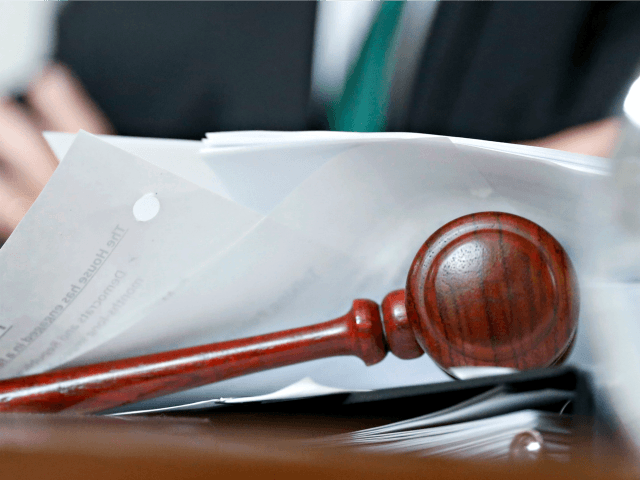On Wednesday, the Tenth Circuit of the U.S. Court of Appeals issued a truly outrageous opinion. The court struck down Kansas’s 2011 law requiring voters to provide proof of citizenship when they register. As Kansas Secretary of State at the time, I was the author of that law—which passed with overwhelming bipartisan majorities in the Kansas Legislature. Not only did virtually every Republican vote in favor, but also more than two-thirds of Democrats voted for the law.
The Tenth Circuit’s ruling was issued by only two judges, since one of the three judges on the judicial panel passed away before he could take part in the decision. And the ruling was no surprise, given who the two remaining judges were. Indeed, it was a textbook example of judicial activism.
The way the Kansas law worked, a voter could either submit a copy of his proof of citizenship—typically a birth certificate or passport—with his registration form, or he could send it in to the county election office up to 90 days later. If the state already had a copy of the voter’s proof of citizenship in the Kansas driver’s license database or in the Kansas birth certificate records, the state would verify the voter’s citizenship for him. It was extremely easy for U.S. citizens to comply with; and Kansas voters were overwhelmingly supportive of it when it was in effect.
Nevertheless, the two Tenth Circuit judges declared that the law violated the National Voter Registration Act (NVRA), as well as the Equal Protection Clause of the 14th Amendment. Both parts of the decision were based on flimsy reasoning.
Regarding the claim that the Kansas law violated the NVRA, the Tenth Circuit disregarded the plain meaning of the federal law’s text, which says absolutely nothing about proof-of-citizenship requirements. Instead the Tenth Circuit invented its own legal test out of whole cloth. According to the two judges, a state must “show that a substantial number of noncitizens registered to vote,” or else the NVRA prohibits a state from requiring proof of citizenship at the DMV. Again, these words are found nowhere in federal law.
The Court seemed oblivious to the fact that it is very difficult to determine whether a person on the voter rolls is an alien or a citizen. One needs some sort of external information—like the person applying for a driver’s license only issued to aliens, or the person declining jury duty because he’s an alien—before one can conclude that he’s not a citizen. Nevertheless, the State of Kansas did find over a hundred aliens who had registered to vote; and an expert witness used statistical sampling to conclude that the true number was likely in the thousands.
But that wasn’t enough for the Tenth Circuit. The judges concluded that the minimal burden of finding one’s birth certificate outweighed the benefit of stopping fraudulent voting by these aliens.
The Tenth Circuit opinion is the epitomy of judicial activism, setting aside the plain meaning of the law and replacing it with a subjective, policy-based balancing test. It reads more like a legislative report than a judicial opinion.
Not only that, the Court ignored the fact that the Senate sponsor of the NVRA, Senator Wendell Ford (D-KY), said on the floor of the Senate in 1993 that “there is nothing in the bill now that would preclude the State’s requiring presentation of documentary evidence of citizenship.” So much for the intentions of Congress.
The section of the opinion holding that the Kansas law violates the Constitution is equally flawed. It is a perversion of the 14th Amendment Equal Protection Clause to say that it prevents a state from requiring voters to prove their citizenship. The drafters and ratifiers of the 14th Amendment in 1866-68 certainly did not intend to ban such requirements. But of course the Tenth Circuit didn’t look to the original intent of the Constitution.
The Tenth Circuit also twisted the 2008 Supreme Court precedent of Crawford v. Marion County Election Board beyond recognition. In that case, the Supreme Court upheld the Indiana photo ID law against a similar constitutional challenge. The Crawford case actually provided strong support for the Kansas proof-of-citizenship law. The Crawford Court said that a state doesn’t need to prove how much voter fraud exists; the mere threat is enough reason to adopt to prevent ineligible people from voting. Crawford also recognized “the legitimacy [and] importance of the State’s interest in counting only the votes of eligible voters,” and a state’s “broad interests in protecting election integrity.”
I could go on. The Tenth Circuit’s opinion is weak on many fronts. If the Kansas Attorney General appeals and the Supreme Court takes the case, it is highly likely that the high court will overturn the decision.
It’s extremely important that the Supreme Court take the case and correct the Tenth Circuit’s errors. As it stands now, Kansas must simply take voters at their word when they check the box indicating that they are U.S. citizens. No verification. No proof. No way of stopping aliens from registering to vote.
There are four states that have enacted proof of citizenship requirements: Kansas, Arizona, Alabama, and Georgia. Other states have considered following the lead of these four, but now the ACLU and other leftist organizations will use the Tenth Circuit’s flawed decision to claim that such requirements are unconstitutional.
The Supreme Court needs to overturn this case. The integrity of our elections is at stake.
Kris W. Kobach is a candidate for the U.S. Senate in 2020 and is the former secretary of state of Kansas, 2011-19. Prior to that, he was a professor of constitutional law for 15 years at UMKC Law School. He is currently General Counsel for We Build the Wall. His website is kriskobach.com.

COMMENTS
Please let us know if you're having issues with commenting.